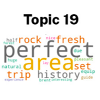Using textual volunteered geographic information to model nature-based activities: A case study from Aotearoa New Zealand
DOI:
https://doi.org/10.5311/JOSIS.2021.23.157Keywords:
cultural ecosystem services, nature-based recreation, volunteered geographic information, social media, digital geographyAbstract
A boom in volunteered geographic information has led to extensive data-driven exploration and modeling of places. While many studies have used such data to explore human-environment interaction in urban settings, few have investigated natural, non-urban settings. To address this gap, this study systematically explores the content of online reviews of nature-based recreation activities, and develops a fine-grained hierarchical model that includes 28 aspects grouped into three main domains: activity, settings, and emotions/cognition. It further demonstrates how the model can be used to explore the variation in recreation experiences across activities, setting the stage for the analysis of the spatio-temporal variations in recreation experiences in the future. Importantly, the study provides an annotated corpus that can be used as a training dataset for developing methods to automatically capture aspects of recreation experiences in texts.

Downloads
Published
Versions
- 2022-01-05 (2)
- 2021-12-24 (1)
Issue
Section
License
Copyright (c) 2021 Ekaterina Egorova

This work is licensed under a Creative Commons Attribution 3.0 Unported License.
Articles in JOSIS are licensed under a Creative Commons Attribution 3.0 License.
